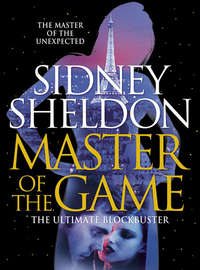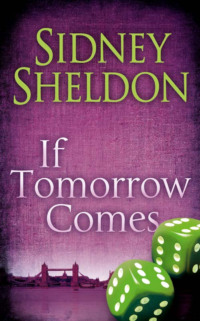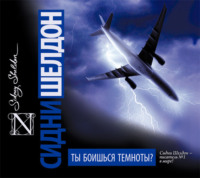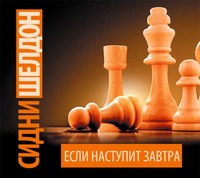
Полная версия
The Sands of Time

SIDNEY SHELDON
THE SANDS OF TIME

To Frances Gordon, with love.
Table of Contents
Cover Page
Title Page
Epigraph
Chapter One
Chapter Two
Chapter Three
Chapter Four
Chapter Five
Chapter Six
Chapter Seven
Chapter Eight
Chapter Nine
Chapter Ten
Chapter Eleven
Chapter Twelve
Chapter Thirteen
Chapter Fourteen
Chapter Fifteen
Chapter Sixteen
Chapter Seventeen
Chapter Eighteen
Chapter Nineteen
Chapter Twenty
Chapter Twenty-one
Chapter Twenty-two
Chapter Twenty-three
Chapter Twenty-four
Chapter Twenty-five
Chapter Twenty-six
Chapter Twenty-seven
Chapter Twenty-eight
Chapter Twenty-nine
Chapter Thirty
Chapter Thirty-one
Chapter Thirty-two
Chapter Thirty-three
Chapter Thirty-four
Chapter Thirty-five
Chapter Thirty-six
Chapter Thirty-seven
Chapter Thirty-eight
Chapter Thirty-nine
Chapter Forty
Chapter Forty-one
Chapter Forty-two
Chapter Forty-three
Chapter Forty-four
Afterword
Author’s Note
Acknowledgement
Books by Sidney Sheldon
About the Author
Copyright
About the Publisher
Lives of great men all remind us
We can make our lives sublime,
And, departing, leave behind us
Footprints on the Sands of Time.
HENRY WADSWORTH LONGFELLOW
Chapter One
Pamplona, Spain 1976
If the plan goes wrong, we will all die. He went over it again in his mind for the last time, probing, testing, searching for flaws. He could find none. The plan was daring, and it called for careful, split-second timing. If it worked, it would be a spectacular feat, worthy of the great El Cid. If it failed …
Well, the time for worrying is past, Jaime Miró thought philosophically. It’s time for action.
Jaime Miró was a legend, a hero to the Basque people and anathema to the Spanish government. He was six feet tall, with a strong, intelligent face, a muscular body, and brooding dark eyes. Witnesses tended to describe him as taller than he was, darker than he was, fiercer than he was. He was a complex man, a realist who understood the enormous odds against him, a romantic ready to die for what he believed.
Pamplona was a town gone mad. It was the final morning of the running of the bulls, the Fiesta de San Fermin, the annual celebration held from 7 July to the 14th. Thirty thousand visitors had swarmed into the city from all over the world. Some had come merely to watch the dangerous bull-running spectacle, others to prove their manhood by taking part in it, running in front of the charging beasts. All the hotel rooms had long since been taken, and university students from Navarra had bedded down in doorways, bank entrances, cars, the public square, and even the streets and pavements of the town.
The tourists packed the cafés and hotels, watching the noisy, colourful parades of papier mâché gigantes, and listening to the music of the marching bands. Members of the parade wore violet cloaks, some with hoods of green, others garnet, and still others wearing golden hoods. Flowing through the streets, the processions looked like rivers of rainbows. Exploding firecrackers running along poles and wires of the tramways added to the noise and general confusion.
The crowd had come to attend the evening bullfights, but the most spectacular event was the Encierro – the early morning running of the bulls that would fight later in the day.
Ten minutes before midnight in the darkened streets of the lower part of town, the bulls had been driven from the corrales de gas, the reception pens, to run across the river on a bridge to the corral at the bottom of Calle Santo Domingo, where they would be kept for the night. In the morning they would be turned loose to run along the narrow Calle Santo Domingo, penned in the street by wooden barricades at each corner until at the end they would run into the corrals at the Plaza de Hemingway, where they would be held until the afternoon bullfight.
From midnight until 6.00 a.m., the visitors stayed awake, drinking and singing and making love, too excited to sleep. Those who would participate in the running of the bulls wore the red scarves of San Fermin around their throats.
At a quarter to six in the morning, bands started circulating through the streets, playing the stirring music of Navarre. At seven o’clock sharp, a rocket flew into the air to signal that the gates of the corral had been opened. The crowd was filled with feverish anticipation. Moments later a second rocket went up to warn the town that the bulls were running.
What followed was an unforgettable spectacle. First came the sound. It started as a faint, distant ripple on the wind, almost imperceptible, and then it grew louder and louder until it became an explosion of pounding hoofs, and suddenly bursting into view appeared six oxen and six enormous bulls. Each weighing 1,500 pounds, they charged down the Calle Santo Domingo like deadly express trains. Inside the wooden barricades that had been placed at each intersecting street corner to keep the bulls confined to the one street, were hundreds of eager, nervous young men who intended to prove their bravery by facing the maddened animals.
The bulls raced down from the far end of the street, past the Calle Estafeta and the Calle de Javier, past farmacias and clothing stores and fruit markets, towards the Plaza de Hemingway, and there were cries of ‘¡Olé!’ from the frenzied crowd. As the animals charged nearer, a mad scramble began to escape the sharp horns and lethal hoofs. The sudden reality of approaching death made some of the participants run for the safety of doorways and fire escapes. They were followed by taunts of ‘cobardón’ – coward. A few in the path of the bulls stumbled and fell and were quickly hauled to safety.
A small boy and his grandfather were standing behind the barricades, both breathless with the excitement of the spectacle taking place only a few feet from them.
‘Look at them!’ the old man exclaimed. ‘¡Magnífico!’
The little boy shuddered. ‘Tengo miedo, abuelo. I’m afraid.’
The old man put his arm around him. ‘Sí, Manuel. It is frightening. But wonderful, too. I once ran with the bulls. There’s nothing like it. You test yourself against death, and it makes you feel like a man.’
As a rule, it took two minutes for the animals to gallop the 900 yards along the Calle Santo Domingo to the arena, and the moment the bulls were safely in the corral, a third rocket would be sent into the air. On this day, the third rocket did not go off, for an incident occurred that had never happened in Pamplona’s 400-year history of the running of the bulls.
As the animals raced down the narrow street, half a dozen men dressed in the colourful costumes of the feria shifted the wooden barricades and the bulls found themselves forced off the restricted street and turned loose into the heart of the city. What had a moment before been a happy celebration instantly turned into a nightmare. The frenzied beasts charged into the stunned onlookers. The young boy and his grandfather were among the first to die, knocked down and trampled by the charging bulls. Vicious horns sliced into a baby’s pram, killing an infant and sending its mother down to the ground to be crushed. Death was in the air everywhere. The animals crashed into helpless bystanders, knocking down women and children, plunging their long, deadly horns into pedestrians, food stands, statues, sweeping aside everything unlucky enough to be in their path. People were screaming in terror, desperately fighting to get out of the way of the lethal behemoths.
A bright red truck suddenly appeared in the path of the bulls and they turned and charged towards it, down the Calle de Estrella, the street that led to the cárcel, Pamplona’s prison.
The cárcel is a forbidding-looking two-storey stone building with heavily barred windows. There are turrets at each of its four corners, and the red and yellow Spanish flag flies over the door. A stone gate leads to a small courtyard. The second floor of the building consists of a row of cells that holds prisoners condemned to die.
Inside the prison, a heavyset guard in the uniform of the policía armada was leading a priest garbed in plain black robes along the second floor corridor. The policeman carried a sub-machine-gun.
Noting the questioning look in the priest’s eye at the sight of the weapon, the guard said, ‘One can’t be too careful here, Father. We have the scum of the earth on this floor.’
The guard directed the priest to walk through a metal detector very much like those used at airports.
‘I’m sorry, Father, but the rules –’
‘Of course, my son.’
As the priest passed through the security portal, a shrieking siren cut through the corridor. The guard instinctively tightened his grip on his weapon.
The priest turned and smiled back at the guard.
‘My mistake,’ he said as he removed a heavy metal cross that hung from his neck on a silver chain and handed it to the guard. This time as he passed through, the machine was silent. The guard handed the cross back to the priest and the two continued their journey deeper into the bowels of the prison.
The stench in the corridor near the cells was overpowering.
The guard was in a philosophical mood. ‘You know, you’re wasting your time here, Father. These animals have no souls to save.’
‘Still, we must try, my son.’
The guard shook his head. ‘I tell you the gates of hell are waiting to welcome both of them.’
The priest looked at the guard in surprise. ‘Both of them? I was told there were three who needed confession.’
The guard shrugged. ‘We saved you some time. Zamora died in the infirmary this morning. Heart attack.’
The men had reached the two farthest cells.
‘Here we are, Father.’
The guard unlocked a cell door, then stepped cautiously back as the priest entered the cell. The guard locked the door again, and stood in the corridor, alert for any sign of trouble.
The priest went to the figure lying on the dirty prison cot. ‘Your name, my son?’
‘Ricardo Mellado.’
The priest stared down at him. It was difficult to tell what the man looked like. His face was swollen and raw. His eyes were almost shut. Through thick lips, he said, ‘I’m glad you were able to come, Father.’
The priest replied, ‘Your salvation is the church’s duty, my son.’
‘They are going to hang me this morning?’
The priest patted his shoulder gently. ‘You have been sentenced to die by the garrotte.’
Ricardo Mellado stared up at him. ‘No!’
‘I’m sorry. The orders were given by the Prime Minister himself.’
The priest placed his hand on the prisoner’s head and intoned: ‘Dime tus pecados …’
Ricardo Mellado said, ‘I have sinned greatly in thought, word and deed, and I repent all my sins with all my heart.’
‘Ruego a nuestro Padre celestial por la salvación de tu alma. En el nombre del Padre, del Hijo y del Espíritu Santo …’
The guard listening outside the cell thought to himself: What a stupid waste of time. God will spit in that one’s eye.
The priest was finished. ‘Adiós, my son. May God receive your soul in peace.’
The priest moved to the cell door and the guard unlocked it, then stepped back, keeping his gun aimed at the prisoner. When the door was locked again, the guard moved to the adjoining cell and opened the door.
‘He’s all yours, Father.’
The priest stepped into the second cell. The man inside had also been badly beaten. The priest looked at him a long moment. ‘What is your name, my son?’
‘Felix Carpio.’ He was a husky, bearded man with a fresh, livid scar on his cheek that the beard failed to conceal. ‘I’m not afraid to die, Father.’
‘That is well, my son. In the end none of us is spared.’
As the priest began to hear Carpio’s confession, waves of distant sound, at first muffled, then growing louder, began to reverberate through the building. It was the thunder of pounding hoofs and the screams of the running mob. The guard listened, startled. The sounds were rapidly moving closer.
‘You’d better hurry, Father. Something peculiar is happening outside.’
‘I’m finished.’
The guard quickly unlocked the cell door. The priest stepped out into the corridor and the guard locked the door behind him. There was the sound of a loud crash from the front of the prison. The guard turned to peer out the narrow, barred window.
‘What the hell was that noise?’
The priest said, ‘It sounded as though someone wishes an audience with us. May I borrow that?’
‘Borrow what?’
‘Your weapon, por favor.’
As the priest spoke, he stepped close to the guard. He silently removed the top of the large cross that hung around his neck, revealing a long, wicked-looking stiletto. In one lightning move he plunged the knife into the guard’s chest.
‘You see, my son,’ Jaime Miró said, as he pulled the sub-machine-gun from the dying guard’s hands, ‘God and I decided that you no longer have need of this weapon.’
The guard slumped to the cement floor. Jaime Miró took the keys from the body and swiftly opened the two cell doors. The sounds from the street were getting louder.
‘Let’s move,’ Jaime commanded.
Ricardo Mellado picked up the machine gun. ‘You make a damned good priest. You almost convinced me.’ He tried to smile with his swollen mouth.
‘They really worked you two over, didn’t they? Don’t worry. They’ll pay for it.’
Jaime Miró put his arms around the two men and helped them down the corridor.
‘What happened to Zamora?’
‘The guards beat him to death. We could hear his screams. They took him off to the infirmary and said he died of a heart attack.’
Ahead of them was a locked iron door.
‘Wait here,’ Jaime Miró said.
He approached the door and said to the guard on the other side, ‘I’m finished here.’
The guard unlocked the door. ‘You’d better hurry, Father. There’s some kind of disturbance going on out –’ He never finished his sentence. As Jaime’s knife went into him, blood welled out of the guard’s mouth.
Jaime motioned to the two men. ‘Come on.’
Felix Carpio picked up the guard’s gun, and they started downstairs. The scene outside was chaos. The police were running around frantically trying to see what was happening and to deal with the crowds of screaming people in the courtyard who were scrambling to escape the maddened bulls. One of the bulls had charged into the front of the building, smashing the stone entrance. Another was tearing into the body of a uniformed guard on the ground. The red truck was in the courtyard, its motor running. In the confusion, the three men went almost unnoticed. Those who did see them were too busy saving themselves to do anything about them.
Without a word, Jaime and his men jumped into the back of the truck and it sped off, scattering frantic pedestrians through the crowded streets. The guardia civil, the para-military rural police decked out in green uniforms and black patent leather hats, were trying in vain to control the hysterical mob. The policía armada, stationed in provincial capitals, were also helpless in the face of the mad spectacle. People were struggling to flee in every direction, desperately trying to avoid the enraged bulls. The danger lay less with the bulls and more with the people themselves as they trampled one another in their eagerness to escape, and old men and women were pushed aside under the feet of the running mob.
Jaime stared in dismay at the stunning spectacle. ‘It wasn’t planned for it to happen this way!’ he exclaimed. He stared helplessly at the carnage that was being wreaked, but there was nothing he could do to stop it. He closed his eyes to shut out the sight.
The truck reached the outskirts of Pamplona and headed south, leaving behind the noise and confusion of the rioting.
‘Where are we going, Jaime?’ Ricardo Mellado asked.
‘There’s a safe house outside Torré. We’ll stay there until dark and then move on.’
Felix Carpio was wincing with pain.
Jaime Miró watched him, his face filled with compassion. ‘We’ll be there soon, my friend,’ he said gently.
He was unable to get the terrible scene at Pamplona out of his mind.
Thirty minutes later they approached the little village of Torré, and skirted it to drive to an isolated house in the mountains above the village. Jaime Miró helped the two men out of the back of the red truck.
‘You’ll be picked up at midnight,’ the driver said.
‘Have them bring a doctor,’ Jaime replied. ‘And get rid of the truck.’
The three of them entered the house. It was a farmhouse, simple and comfortable, with a fireplace in the living room and a beamed ceiling. There was a note on the table. Jaime Miró read it and smiled at the welcoming phrase: Mi casa es su casa. On the bar were bottles of wine. Jaime Miró poured drinks.
Ricardo Mellado said, ‘There are no words to thank you, my friend. Here’s to you.’
Jaime raised his glass. ‘Here’s to freedom.’
There was the sudden chirp of a canary in a cage. Jaime Miró walked over to it, and he watched its wild fluttering for a moment. Then he opened the cage, gently lifted the bird out and carried it to an open window.
‘Fly away, pajarito,’ he said softly. ‘All living creatures should be free.’
Chapter Two
Madrid
Prime Minister Leopoldo Martinez was in a rage. He was a small, bespectacled man, and his whole body shook as he talked. ‘Jaime Miró must be stopped,’ he cried. His voice was high and shrill. ‘Do you understand me?’ He glared at the half dozen men gathered in the room. ‘We’re looking for one terrorist, and the whole army and police force are unable to find him.’
The meeting was taking place at Moncloa Palace, where the Prime Minister lived and worked, five kilometres from the centre of Madrid, on the Carretera de Galicia, a highway with no identifying signs. The building itself was green brick, with wrought iron balconies, green window shades, and guard towers at each corner.
It was a hot, dry day, and through the windows, as far as the eye could see, columns of heat waves rose like battalions of ghostly soldiers.
‘Yesterday Miró turned Pamplona into a battleground.’ Martinez slammed a fist down on his desk. ‘He murdered two prison guards and smuggled two of his terrorists out of prison. Many innocent people were killed by the bulls he let loose.’
For a moment no one said anything.
When the Prime Minister had taken office, he had declared, smugly, ‘My first act will be to put a stop to these separatist groups. Madrid is the great unifier. It transforms Andalusians, Basques, Catalans and Galicians into Spaniards.’
He had been unduly optimistic. The fiercely independent Basques had other ideas, and the wave of bombings, bank robberies and demonstrations by terrorists of the ETA organization, Euzkadi ta Azkatasuna, had continued unabated.
The man at Martinez’s right said quietly, ‘I’ll find him.’
The speaker was Colonel Ramón Acoca, head of the GOE, the Grupo de Operaciones Especiales, formed to pursue Basque terrorists. Acoca was a giant, in his middle sixties, with a scarred face and cold, obsidian eyes. He had been a young officer under Francisco Franco during the Civil War, and he was still fanatically devoted to Franco’s philosophy, ‘We are responsible only to God and to history.’
Acoca was a brilliant officer, and he had been one of Franco’s most trusted aides. The Colonel missed the iron-fisted discipline, the swift punishment of those who questioned or disobeyed the law. He had gone through the turmoil of the Civil War, with its Nationalist alliance of Monarchists, rebel generals, landowners, church hierarchy and the fascist Falangists on one side, and the Republican government forces, including Socialists, Communists, liberals and Basque and Catalan separatists on the other. It had been a terrible time of destruction and killing in a madness that pulled in men and war matériel from a dozen countries and left a horrifying death toll. And now the Basques were fighting and killing again.
Colonel Acoca headed an efficient, ruthless cadre of anti-terrorists. His men worked underground, wore disguises and were neither publicized nor photographed for fear of retaliation.
If anyone can stop Jaime Miró, Colonel Acoca can, the Prime Minister thought. But there was a catch: Who’s going to be the one to stop Colonel Acoca?
Putting the Colonel in charge had not been the Prime Minister’s idea. He had received a phone call in the middle of the night on his private line. He recognized the voice immediately.
‘We are greatly disturbed by the activities of Jaime Miró and his terrorists. We suggest that you put Colonel Ramón Acoca in charge of the GOE. Is that clear?’
‘Yes, sir. It will be taken care of immediately.’
The line went dead.
The voice belonged to a member of the OPUS MUNDO. The organization was a secret cabal that included bankers, lawyers, heads of powerful corporations and government ministers. It was rumoured to have enormous funds at its disposal, but where the money came from or how it was used or manipulated was a mystery. It was not considered healthy to ask too many questions about it.
The Prime Minister had placed Colonel Acoca in charge, as he had been instructed to, but the giant had turned out to be an uncontrollable fanatic. His GOE had created a reign of terror. The Prime Minister thought of the Basque rebels Acoca’s men had caught near Pamplona. They had been convicted and sentenced to hang. It was Colonel Acoca who had insisted that they be executed by the barbaric garrote vil, the iron collar fitted with a spike which gradually tightened, eventually cracked the vertebra and severed the victim’s spinal cord.
Jaime Miró had become an obsession with Colonel Acoca.
‘I want his head,’ Colonel Acoca said. ‘Cut off his head and the Basque movement dies.’
An exaggeration, the Prime Minister felt, although he had to admit that there was a core of truth in it. Jaime Miró was a charismatic leader, fanatical about his cause, and therefore dangerous.
But in his own way, the Prime Minister thought, Colonel Acoca is just as dangerous.
Primo Casado, the Director General de Seguridad, was speaking. ‘Your Excellency, no one could have foreseen what happened in Pamplona. Jaime Miró is –’








